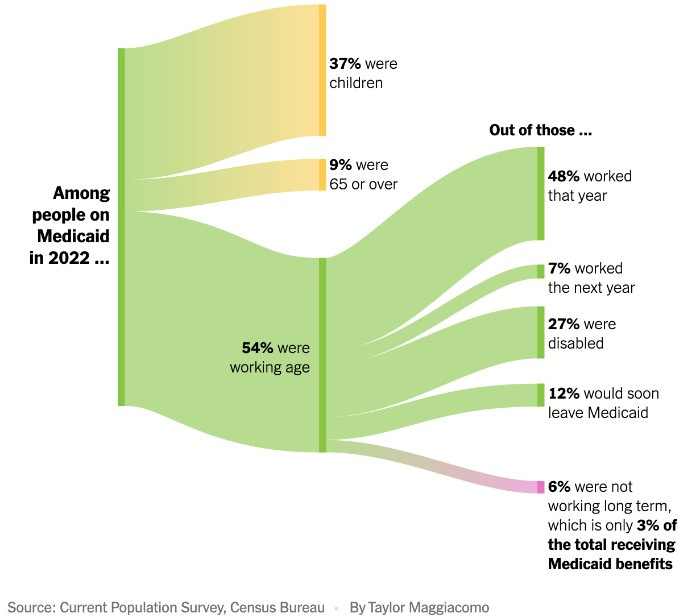"Some People Are Lazy Dirtbags" is the Magic Phrase that Lets Democrats Talk About Medicaid Work Requirements
You must speak those words to enter this debate
Republicans in Congress are making work requirements for Medicaid part of their budget bill. This is popular; 62 percent of Americans support work requirements for Medicaid. And, honestly, I’ll bet that number would be higher if a lot people weren’t thinking of Medicare and wondering “how do you force a bunch of 85 year-olds back to work — how many greeters does Walmart need?”
Many on the left think that Medicaid work requirements are bad policy; their main point is that the cost “savings” come overwhelmingly from eligible Medicaid recipients who fail to navigate bureaucratic hurdles. I agree with those analyses — adding a work requirement to Medicaid is like “family style” dining in that it sounds great but sucks in practice.1 A lot of deserving people will get hurt by the effort to root out the undeserving, and the government won’t reduce costs so much as move them around.
Explaining why Medicaid work requirements are bad policy takes a minute. And I worry that few people will grant Democrats that minute if we don’t make it clear that — conceptually — the government should definitely not be subsidizing people to sit around and play Grand Theft Auto VI. Unfortunately, some progressives have made it their mission in life to advocate for lazy dirtbags, who are small in number but loom large in our psyches. To many people, this is a fairness issue — it triggers our innate “fuck you then” reflex — and Democrats need to understand that. We need to make it clear that if there was a sensible policy to give a double middle finger to lazy dirtbags and no one else, we would support that, but that Medicaid work requirements are not that policy.
About lazy dirtbags: They exist. I’ve got one in my family — I’ll call him “Curt”, because that’s his first name.2 Don’t worry, Curt doesn’t read this, he honestly doesn’t read anything except yet another a positive pregnancy test from the rotating cast of girlfriends that I just call “The Tiffanys”. I don’t know how Curt came to be how he is, my aunts have held a 30-year brainstorming session on this topic with inconclusive results. But I think of Curt when someone makes it sound as though anyone who’s going through tough times is a victim of circumstance — Curt’s not a victim of circumstance! Not on the societal level, anyway; maybe he got dealt the “lazy asshole” gene, which I suppose is a form of circumstantial bad luck. But there’s no societal fix for what ails Curt; you could drop him into the egalitarian utopia from Gulliver’s Travels, and within one week, the giants would be saying “So…you’re just gonna sit there on your little couch made from a kitchen sponge with your feet up on your bottle cap coffee table? Get an itty-bitty job, deadbeat.”
Luckily, evidence suggests that people like Curt are quite rare. This graphic recently ran in The New York Times:
Only three percent of Medicaid recipients are unemployed long-term. Sure, there are probably a few Curts hiding elsewhere in those streams — plus children are sort of Evolution’s Deadbeats — but the fact remains: Only a small number of people on Medicaid are on anything resembling a “gravy train”. Most work or have a valid reason why they can’t work, assuming that we accept “am a child and can’t be forced to toil in an anvil factory like back when America was great” as a valid reason.
If you’ve ever looked at the American healthcare system and thought “it should be more of a Kafkaesque nightmare designed by lunatics and run by clowns,” then work requirements are the policy for you. Georgia tried them and spent five times as much setting up the verification system as they did on health care in the first year. Many eligible people lose coverage because they fail to clear bureaucratic hurdles, and I sympathise with that, because I am so bad at paperwork that I feel like my condition should be AMA-recognized. I have a mental block with forms — I always put my first name and last name in the wrong order, I put my address above where it says “address” when it should have gone below (and vice-versa), and if you ask me for my employer’s fax number, my brain will explode like the dye canister in a stolen bag of money. My response to the hassle of jumping through bureaucratic hoops to access health care is not to tell people “just jump through the hoops,” because I know I would fail to jump through the hoops, and I would also break my leg while doing so, and then show up in the ER without insurance.
Health insurance is also the one government benefit that you might want a person to have even if they’re kind of a piece of shit who doesn’t deserve it. Giving people health insurance costs money, but not giving them health insurance costs money, too. This is mostly because people without health insurance often skip preventative care, which can lead to big bills later on, and you can only dodge those if you’re a “let them die in the streets” libertarian. It’s also bad when someone without insurance shows up in the ER — the cost of that person’s care always gets borne by someone, usually the hospital or the hospital’s customers. Republicans who talk about saving money through Medicaid cuts are talking about saving the government money, but the costs to society are harder to glean and might actually be negative.
I think that many people would find these arguments persuasive if they heard them. But I also think that nobody will hear these arguments if Democrats fail to make it clear that we’re not carrying water for the few truly lazy dirtbags in the world. There’s a type of progressive that will simply never, ever blame the presumed “disadvantaged” person for anything, no matter what. There’s a passage in San Fransicko in which a person at a nonprofit defends the rights of homeless people to shit in your driveway — that type of lunacy will never be part of any successful governing philosophy. Some progressives interpret “protect the vulnerable” to mean “become a lobbyist for the most antisocial people on Earth, even when they’re shitting on the social contract and/or your driveway.” Many voters want to know that a Democrat is not that type of weirdo before they’ll give them the time of day.
It’s also possible to erode trust by acting like every last person on Medicaid is deserving and not one single person is being lazy. Many of us have a Curt in our lives — we know these people exist. Plus, it’s obnoxious to pretend that America does nothing to help the poor; we actually do many things, including direct transfers like social security, SNAP, and the Earned Income Tax Credit, and indirect transfers like how the wealthy basically subsidize college for the less wealthy. You can argue that we should do more or less, I’m typically in the “more” camp, but you won’t convince taxpayers to do more if you won’t acknowledge the stuff they’re already doing. Some progressives like to pretend that we live in a brutal hellscape brought on by “late capitalism”, but that narrative is both plainly wrong and part of the “Amerikkka sux” narrative that turns people off.
A Democrat who can convince people that they support policies to keep deadbeats and scammers from ripping off the government might get people to listen long enough to tell them that Medicaid work requirements are not that policy. These work requirements are a “swatting flies with a sledgehammer” approach that will mainly hurt the working poor. The fact that Republicans are pursuing these cuts largely to offset a small portion of a regressive tax cut is the coup de grâce — that tradeoff makes the Luka Dončić trade look like the deal of the century. Democrats can say that Republicans are prioritizing the rich over the working poor, and they’ll be right, but Democrats need to also say “lazy dirtbags exist” before anyone will listen.
I feel like there’s always one dish that everyone wants, and everyone ends up with a small amount of that dish. Meanwhile, one person lobbies hard for creamed spinach, they’re they only one who eats it, and 80 percent of it gets thrown away.
Actually, no, his name is not Curt; I have given my relative — who also has a different last name from me — some anonymity. But I liked the joke of “I’ll call him that because that’s his name”.




It's "coup de grâce" ('mercy blow') that finishes you off. "Coup de gras" would mean "hit with/by fat". Sincerely, an obnoxious French reader.
Nice article! =)
You know who’s made a strong case against Republicans messing with Medicaid? A Republican, specifically Sen. Josh Hawley, the otherwise very conservative Senior Senator from the State of Missouri.
https://www.nytimes.com/2025/05/12/opinion/josh-hawley-dont-cut-medicaid.html?smid=nytcore-ios-share&referringSource=articleShare
As for Missouri, it is one of 40 Medicaid expansion states — because our voters wanted it that way. In 2020, the same year Mr. Trump carried the Missouri popular vote by a decisive margin, voters mandated that the state expand Medicaid coverage to working-class individuals unable to afford health care elsewhere. Voters went so far as to inscribe that expansion in our state Constitution. Now some 21 percent of Missourians benefit from Medicaid or CHIP, the companion insurance program for lower-income children. And many of our rural hospitals and health providers depend on the funding from these programs to keep their doors open.
All of which means this: If Congress cuts funding for Medicaid benefits, Missouri workers and their children will lose their health care. And hospitals will close. It’s that simple. And that pattern will be replicated in states across the country.
One of my constituents, a married mother of five, contacted me to explain why Medicaid is vital to her 8-year-old daughter, who depends on a feeding tube to survive. Formula, pump rentals, feeding extensions and other treatments cost $1,500 a month; prescriptions nearly double that cost. These expenses aren’t covered by private insurance. The mother wrote to me, “Without Medicaid, we would lose everything — our home, our vehicles and, eventually, our daughter.”